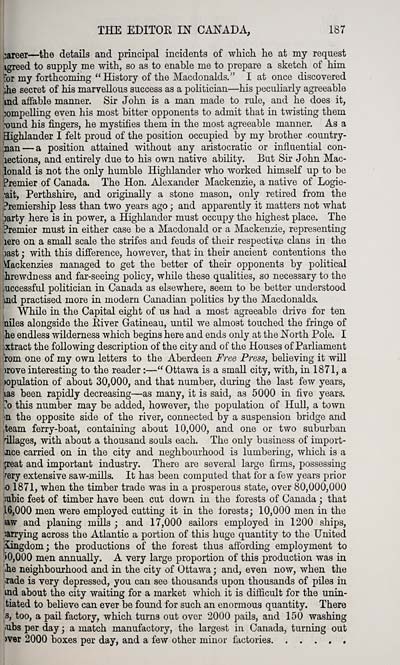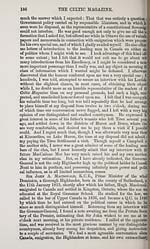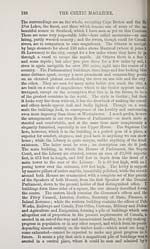Blair Collection > Celtic magazine > Volume 5
(197)
Download files
Complete book:
Individual page:
Thumbnail gallery: Grid view | List view

! THE EDITOR IN CANADA, 187
ijareer — the details and principal incidents of which he at my request
igreed to supply me with, so as to enable me to prepare a sketch of him
for my forthcoming "History of the Macdonalds." I at once discovered
Jie secret of his marvellous success as a politician — his peculiarly agreeable
md affable manner. Sir Jolin is a man made to rule, and he does it,
jompeUing even his most bitter opponents to admit that in twisting them
':ound his fingers, he mystifies them in the most agreeable manner. As a
Highlander I felt proud of the position occupied by my brother country-
inan — a position attained without any aristocratic or influential con-
lections, and entirely due to his own native ability. But Sir John Mac-
lonald is not the only humble Highlander who worked himself up to be
Premier of Canada. The Hon. Alexander Mackenzie, a native of Logie-
•ait, Perthshire, and originally a stone mason, only retired from the
Premiership less than two years ago ; and apparently it matters not what
)arty here is in power, a Highlander must occupy the highest place. The
premier must in either case be a Macdonald or a Mackenzie, representing
lere on a small scale the strifes and feuds of their respective clans in the
)ast ; with this difference, however, that in their ancient contentions the
Mackenzies managed to get the better of their opponents by political
hrewdness and far-seeing policy, whUe these qualities, so necessary to the
>uccessfid politician in Canada as elsewhere, seem to be better understood
lind practised more in modern Canadian politics by the Macdonalds.
WhUe in the Capital eight of us had a most agreeable drive for ten
iiules alongside the Eiver Gatineau, untU we almost touched the fringe of
he endless wilderness which begins here and ends only at the North Pole. I
xtract the folio wiug description of the city and of the Houses of Parliament
irom one of my own letters to the Aberdeen Free Press, believing it will
)rove interesting to the reader : — " Ottawa is a small city, with, in 1871, a
wpulation of about 30,000, and that number, during the last few years,
las been rapidly decreasing — as many, it is said, as 5000 in five years.
ro this number may be added, however, the population of Hull, a town
'n the opposite side of the river, connected by a suspension bridge and
,team ferry-boat, containing about 10,000, and one or two suburban
nllages, with about a thousand souls each. The only business of import-
Jice carried on ia the city and neghbourhood is lumbering, which is a
jieat and important industry. There are several large firms, possessing
>ery extensive saw-mills. It has been computed that for a few years prior
o 1871, when the timber trade was in a prosperous state, over 80,000,000
jubic feet of timber have been cut down in the forests of Canada ; that
.16,000 men were employed cutting it in the forests; 10,000 men in the
law and planing miUs ; and 17,000 sailors employed in 1200 ships,
sarrying across the Atlantic a portion of this huge quantity to the United
kingdom; the productions of the forest thus affording employment to
>0,000 men annually. A very large proportion of this production was ia
'he neighbourhood and in the city of Ottawa ; and, even now, when the
>rade is very depressed, you can see thousands upon thousands of piles in
ind about the city waiting for a market which it is difficult for the unia-
tiated to believe can ever be found for such an enormous quantity. There
s, too, a paO. factory, which turns out over 2000 pails, and 150 washing
rUbs per day ; a match manufactory, the largest in Canada, turning out
:)Ver 2000 boxes per day, and a few other minor factories
ijareer — the details and principal incidents of which he at my request
igreed to supply me with, so as to enable me to prepare a sketch of him
for my forthcoming "History of the Macdonalds." I at once discovered
Jie secret of his marvellous success as a politician — his peculiarly agreeable
md affable manner. Sir Jolin is a man made to rule, and he does it,
jompeUing even his most bitter opponents to admit that in twisting them
':ound his fingers, he mystifies them in the most agreeable manner. As a
Highlander I felt proud of the position occupied by my brother country-
inan — a position attained without any aristocratic or influential con-
lections, and entirely due to his own native ability. But Sir John Mac-
lonald is not the only humble Highlander who worked himself up to be
Premier of Canada. The Hon. Alexander Mackenzie, a native of Logie-
•ait, Perthshire, and originally a stone mason, only retired from the
Premiership less than two years ago ; and apparently it matters not what
)arty here is in power, a Highlander must occupy the highest place. The
premier must in either case be a Macdonald or a Mackenzie, representing
lere on a small scale the strifes and feuds of their respective clans in the
)ast ; with this difference, however, that in their ancient contentions the
Mackenzies managed to get the better of their opponents by political
hrewdness and far-seeing policy, whUe these qualities, so necessary to the
>uccessfid politician in Canada as elsewhere, seem to be better understood
lind practised more in modern Canadian politics by the Macdonalds.
WhUe in the Capital eight of us had a most agreeable drive for ten
iiules alongside the Eiver Gatineau, untU we almost touched the fringe of
he endless wilderness which begins here and ends only at the North Pole. I
xtract the folio wiug description of the city and of the Houses of Parliament
irom one of my own letters to the Aberdeen Free Press, believing it will
)rove interesting to the reader : — " Ottawa is a small city, with, in 1871, a
wpulation of about 30,000, and that number, during the last few years,
las been rapidly decreasing — as many, it is said, as 5000 in five years.
ro this number may be added, however, the population of Hull, a town
'n the opposite side of the river, connected by a suspension bridge and
,team ferry-boat, containing about 10,000, and one or two suburban
nllages, with about a thousand souls each. The only business of import-
Jice carried on ia the city and neghbourhood is lumbering, which is a
jieat and important industry. There are several large firms, possessing
>ery extensive saw-mills. It has been computed that for a few years prior
o 1871, when the timber trade was in a prosperous state, over 80,000,000
jubic feet of timber have been cut down in the forests of Canada ; that
.16,000 men were employed cutting it in the forests; 10,000 men in the
law and planing miUs ; and 17,000 sailors employed in 1200 ships,
sarrying across the Atlantic a portion of this huge quantity to the United
kingdom; the productions of the forest thus affording employment to
>0,000 men annually. A very large proportion of this production was ia
'he neighbourhood and in the city of Ottawa ; and, even now, when the
>rade is very depressed, you can see thousands upon thousands of piles in
ind about the city waiting for a market which it is difficult for the unia-
tiated to believe can ever be found for such an enormous quantity. There
s, too, a paO. factory, which turns out over 2000 pails, and 150 washing
rUbs per day ; a match manufactory, the largest in Canada, turning out
:)Ver 2000 boxes per day, and a few other minor factories
Set display mode to: Large image | Transcription
Images and transcriptions on this page, including medium image downloads, may be used under the Creative Commons Attribution 4.0 International Licence unless otherwise stated. ![]()
| Early Gaelic Book Collections > Blair Collection > Celtic magazine > Volume 5 > (197) |
|---|
| Permanent URL | https://digital.nls.uk/76451219 |
|---|
| Description | Volume V, 1880. |
|---|---|
| Shelfmark | Blair.6 |
| Attribution and copyright: |
|
| Description | A selection of books from a collection of more than 500 titles, mostly on religious and literary topics. Also includes some material dealing with other Celtic languages and societies. Collection created towards the end of the 19th century by Lady Evelyn Stewart Murray. |
|---|
| Description | Selected items from five 'Special and Named Printed Collections'. Includes books in Gaelic and other Celtic languages, works about the Gaels, their languages, literature, culture and history. |
|---|

